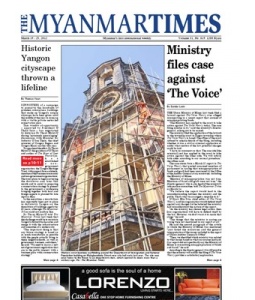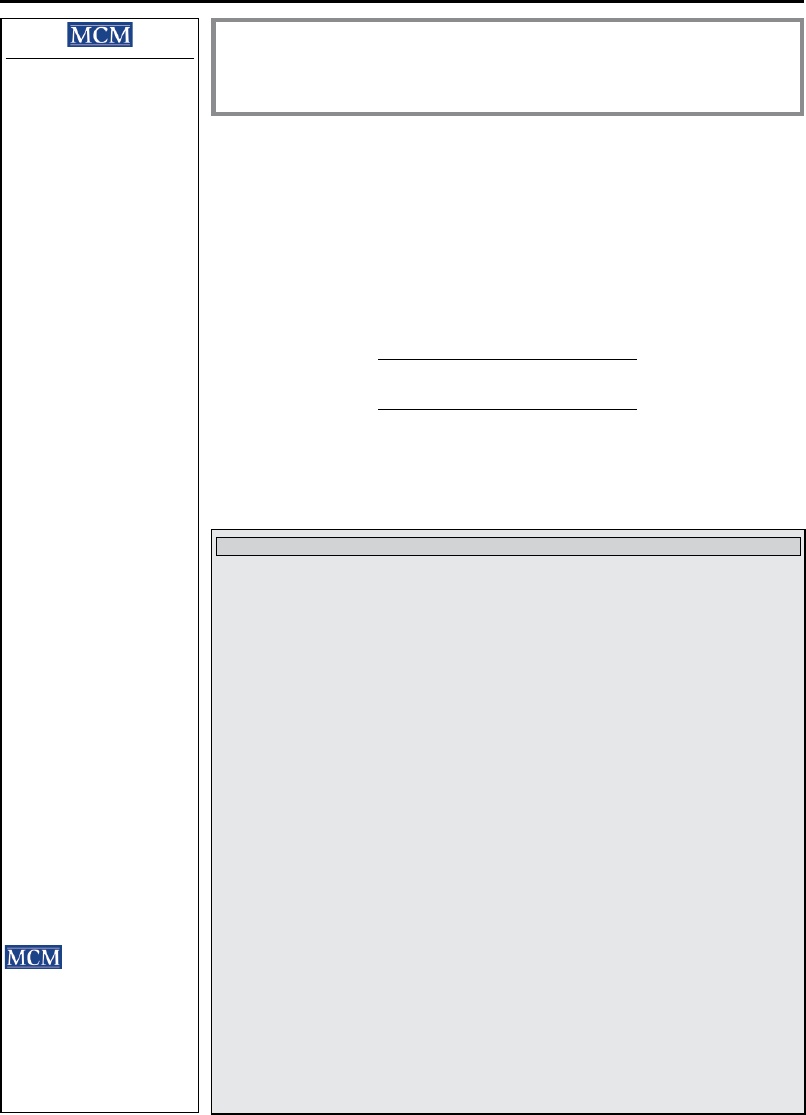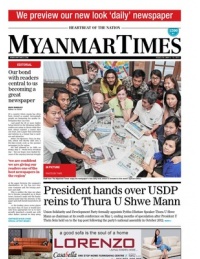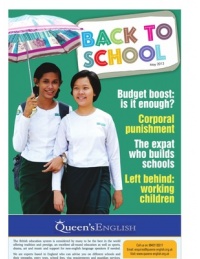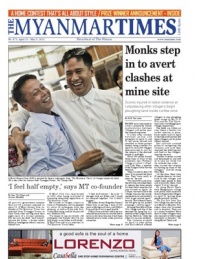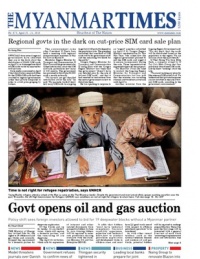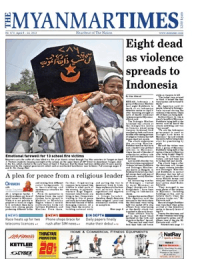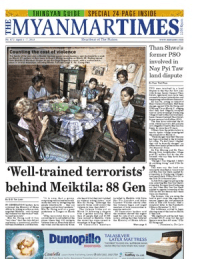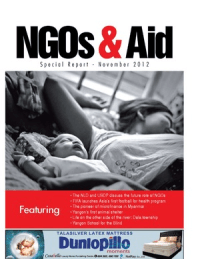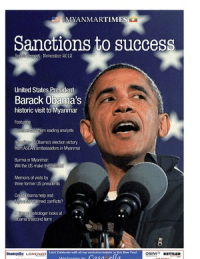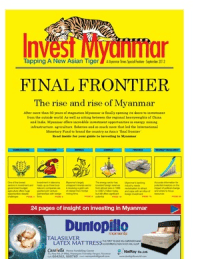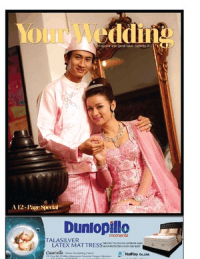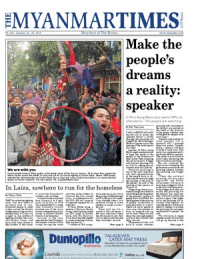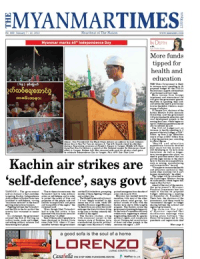myanmar
times
t H e
March 19 - 25, 2012
Myanmar’s first international weekly Volume 31, No. 619 1200 Kyats
By Sandar Lwin
THE Union Ministry of Mines last week filed alawsuit against
The Voice Weekly
over allegedmisreporting in a recent report that accused of misappropriating funds.“The Ministry has applied to the court to takeaction against
The Voice Weekly
today. The casefiling number is 51,” said the ministry’s directorgeneral, asking not to be named.The ministry filed the application of the lawsuitto the township court in Dagon township where
The Voice Weekly
is based. The officer of the courtrefused to release details of the filing, includingwhether it was a civil or criminal application orunder what section of the law potential chargescould be laid.“I have no comment on that. The one side [theministry] just has applied to the court to takeaction against the other side. We will informboth sides according to our normal procedure,”the officer said.The case stems from a March 12 report in
TheVoice Weekly
that quoted unnamed members of parliament as saying that misappropriation of funds and graft had been uncovered by the Officeof the Auditor General at six ministries, includingthe Ministry of Mines.“Mention of misappropriation was not true.Mentions of fraud and graft were not true,” thedirector general, who is also head of the ministry’sinformation committee, told
The Myanmar Times
on March 14.“We believe the report would lead to themisunderstanding between the ministry and thepublic. That’s why we arranged a response to it.”U Kyaw Min Swe, chief editor of
The VoiceWeekly
, said his organisation would defend itself against any charges but he believed the ministryhad misunderstood the nature of the report.“As the ministry has chosen legal action, then[our organisation] will have to defend itself bythe law. However, we don’t want it to reach thatstage,” he said.“The things that the ministry is saying arewrong were not mentioned in our report at all.”He said the second paragraph of the articlein which the Ministry of Mines was mentioned“just listed the ministries and the generalinterpretation of the issues included in the reportof Union Auditor General’s Office”.“Then, we identified which ministry was relatedto what issues based on what our sources had said.Our report did not specifically say the Ministry of Mines is committing misappropriations of fundsand fraud,” he said According to the director general, it is still possiblethat the ministry will nullify the filing if
The VoiceWeekly
provides a satisfactory explanation.
Workers erect bamboo scaffolding around the Department of Immigration and NationalPopulation building on Mahabandoola Street near city hall early last year. The site wasonce home to the Rowe & Co department store, which opened its doors more than acentury ago.
Pic: The Myanmar Times
More page 4More page 4By Thomas Kean
SUPPORTERS of a campaignto preserve the hundreds of priceless colonial-era buildingsthat make up Yangon’s uniquecityscape have been given untilthe middle of the year to come upwith a viable private sector-ledconservation plan.This window of opportunity– approved by President UThein Sein – was negotiatedby historian Dr Thant Myint-Uduring “extremely encouraging”discussions with Minister forIndustry U Soe Thein, the chief minister of Yangon Region and Yangon Mayor earlier this year.To spearhead the effort, Dr ThantMyint-U, the grandson of U Thantand author of
The River of Lost Footsteps
,hasestablisheda non-governmentorganisation, the Yangon HeritageTrust, with support from architects,members of the business communityand non-government organisations.The trust plans to begin surveyingthe downtown area later thismonth and to assist in preparinga conservation strategy to presentto the government a conferencebringing together both local andforeign experts is planned for late April or May.In the meantime, a moratoriumhas reportedly been put in placein downtown Yangon on thedemolition of buildings aged over50 years, although
The MyanmarTimes
could not confirm this.Dr Thant Myint-U told
The Myanmar Times
last week thatthe challenge would be to maintain Yangon’s distinctive character andmerge it with the infrastructureand amenities of a modern city.“The important thing is thatany future strategy is based onas much consultation as possiblewith the people actually living inthese neighbourhoods, as well asgovernment, business, and others,”he said. “We need to marry a newset of government regulations thatare in the public interest, with abusiness plan, with a conservationstrategy.”
Historic Yangoncityscapethrown alifeline
Read moreon p10-11
Ministryfiles caseagainst‘The Voice’
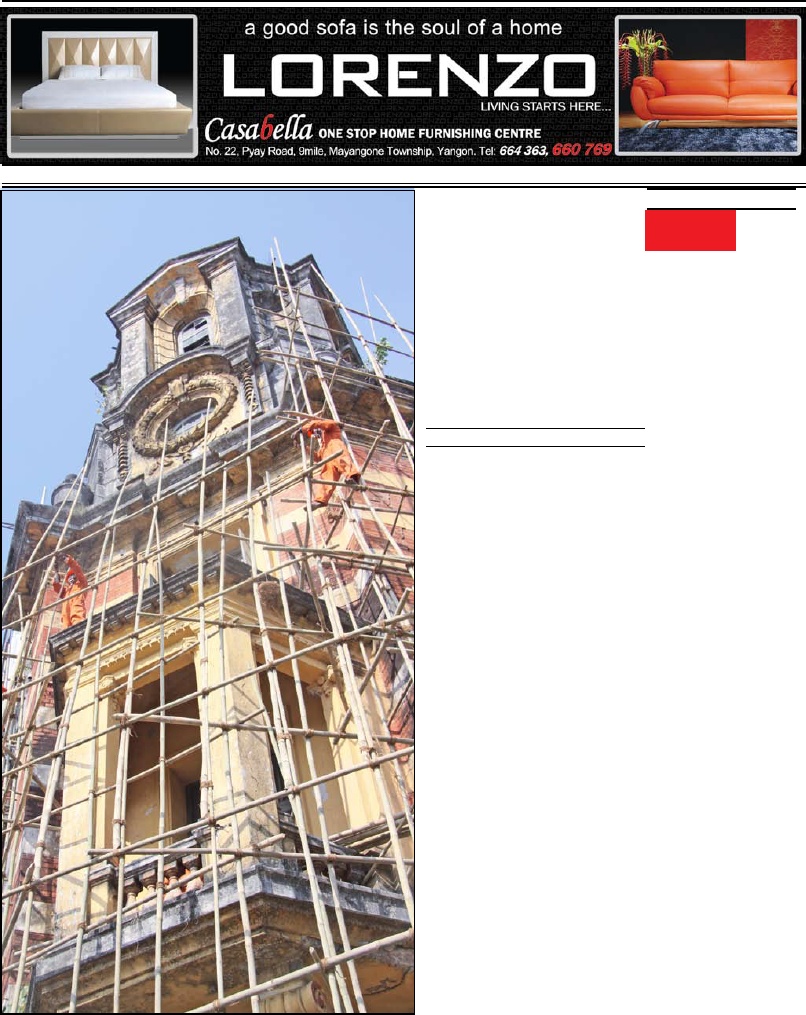




C
omment
the
M
yanMar
t
iMes
2
March 19 - 25, 2012
The Mail Box
Got something to say? We want to hear rom you. Address all correspondenceto the Editor,
The Myanmar Times
(English). We endeavour to respond to all cor-respondencei n a timely manner.Address: 379-383, Bo Aung Kyaw Street, Kyauktada township, Yangon. Telephone: (+951) 392-928, 253-642. Fax: (+951) 392-706Email: your.myanmar.times@gmail.com
THERE are few places inthis hemisphere, aside from Australia, where citizens scorntheir leaders with such fervour asthey do in Hong Kong.The fact that the territory’s7.1 million people have oneof the world’s most effectivegovernments only makes theircontempt all the more admirable.In normal times, they reservetheir jaundiced views aboutlocal politicians for when theyare taking a break from moreimportant matters, like eating,drinking and making money.Not this year though. Theheated public discourse about thethree candidates in the March25 election for a new Hong Kongchief executive is relentless andall-pervasive.It is hardly surprising, giventhat the sensational revelationsabout the contenders would beperfect fodder for a steamy HongKong movie full of influencepeddling, illicit sex and otherhanky panky.For starters, the territory’saggressive media has recentlyrevealed that illegal constructionwork has taken place at thefamily home of the leadingcandidate, former chief secretaryHenry Tang.The work involved expandingTang’s basement into a 200-square-metre recreation areathat includes fitness andchanging rooms, a cinema and awine-tasting lounge.Nothing outranks propertyissues in jam-packed Hong Kong,and Tang’s extensive basementfolly – twice the size of morethan 90 percent of the territory’shomes – provoked outrage.He later claimed it was hiswife’s idea and that while heknew the work was illegal, hekept quiet in order to maintain asemblance of marital harmony.To put it mildly, that is anarea Tang, 59, needs to workon. Already, he has admitted toa couple of extramarital affairsand has reportedly fathered anillegitimate child. As a result, there have beenwidespread calls for him towithdraw from the race.But as the candidate favouredby Hong Kong’s real mastersin Beijing, and with the crucialsupport of local billionaires likeLi Ka-shing and Lee Shau-kee,Tang has insisted he is notpulling out.His poll numbers, however,have suffered badly. At one time,he was running 30 percentagepoints ahead of his strongestopponent, Leung Chun-ying, asurveyor and former governmentadviser. As a policeman’s son, Leunghas been able to reach out toplain folks who are upset atHong Kong’s yawning wealthgap, whereas the well-heeledTang, a textile magnate’s son,has trouble connecting with themiddle-class. And now, with his campaignmired in scandal, Tang hasnot only fallen behind Leung,but even Beijing has turnedlukewarm on his candidatureand has extended its approval toLeung.It was not unexpected sincemainland leaders have alwayssaid the territory’s next bossmust be patriotic to both Beijingand Hong Kong, as well as ableto govern and win public support.Tang has not given up,however, and recently heasserted that all his scandalswere now out in the open andwere personal matters that didnot impede his work.In contrast, he said his rivallacked administrative experienceand had committed more seriousoffences, such as a conflict of interest allegation when Leunghelped choose a municipal artscentre 12 years ago.The charge is an old potatounlikely to sprout any gains forTang, who now trails Leung bymore than 33 percentage pointsand is barely ahead of the thirdcontender, outsider Albert Ho. As the Democratic Party’scandidate, Ho advocatesgreater openness and the earlyintroduction of a one-man, one-vote system. He has no chanceunder the current electionprocess.Of course, it is a misnomerto call it an election, since thevictor will be chosen by a 1200-member committee (about 0.01pcof Hong Kong’s population),comprising mostly businessmenand professionals.Beijing has, however, agreedto allow universal suffrage forthe next election in 2017, and if that pledge is honoured, then Hoand co are likely to prevail overprivileged elites like the taintedTang.
In Hong Kong, scandalsaplenty ahead of ‘election’
Hong Kong chief executive candidate Henry Tang poses for a picture with a supporter on the streets ofHong Kong on March 14.
Pic: AFP
By Adam McCarty
IN 1955, development economistSimon Kuznets presented a theoryof the relationship between incomeinequality in a country and thepath to becoming a rich developedcountry.He argued that income inequalityincreased in the early decades,when countries were “taking off” atcatch-up rates of GDP growth (6-10percent a year). When countriesbecame rich, income inequalitydecreased. This was subsequentlyknown as the Kuznets Curve.This idea stuck, and thus incomeinequality came to be seen as “aprice to pay” for rapid growth. Theproblem, however, was that it waswrong. Mr Kuznets had little data,which was really only collectedfrom about 1962 for developingeconomies. Hans Rowlings hasshown us that data since 1962 tellsus to throw out many pre-conceivedideas (see www.ted.com), and one of them is the Kuznets Curve.Myanmar can and must havebalanced and equitable growth, andit can do so while growing rapidly.Equitable growth is the foundationfor sustained development withsocial stability, which is particularlyimportant in ethnically diversecountries. Many East Asiancountries have achieved thesedual objectives in recent decadesand Myanmar can look to them forbasic policy lessons. Here I wouldhighlight four.
Land reform
Rapid growth begins with somedecades of people moving fromfarms to factories. That stage hasfinished in China, is about to finishin Vietnam, and is about to start inMyanmar. On the farm, as there arefewer people, labour productivityincreases (particularly if combinedwith family planning campaigns).Rural households save more, andso living standards increase – not asfast as urban households, but not toofar behind either. This happy storyonly works if households own theirland; otherwise they become contractor salaried farmers to landlords (orlarge foreign investors), who reap theprofits as rural household incomesstagnate. Some Latin Americancountries (and the Philippines, andmaybe soon Cambodia) have thatproblem.
Universal education
Basic primary education for thewhole population is the foundationupon which to build an equitablesociety. Fortunately, Myanmar,has a literacy rate of over 90pc,according to 2010 survey data,which puts it up there with Chinaand Vietnam rather than down withIndia (74pc), Cambodia (76pc), orBangladesh (56pc).
Progressive fiscal transfers and ruraldevelopment programs
The government can play a directrole to promote equality by raisingfunds in rich areas and giving themto poor areas. China and Vietnamdo that, firstly by budget transfersto poor provinces, and secondly byfunding sub-national governmentsto implement specific poverty,education and health projects. Vietnam does this more than China,and it has been argued that thisalone explains why Vietnam’sgrowth path has been more equitablethan China’s. In 2006, Vietnamspent 5.6pc of GDP on equalisingtransfers to provinces (China 2.2pc),and a further 8.8pc of GDP onprovincial development investments(China 2.2pc). Ho Chi Minh City, forexample, raised revenues of US$640per person, but spent only $194 perperson – the balance paying for thelarge transfers.
Household-friendly and pro-competition industry policies
Rapid growth is driven by urbanarea employment creation andthe emergence of a high-savingmiddle class. Letting householdsand companies do business withclear regulations, transparentand fair taxation, legal protection,and working infrastructure areaspects of the package of policiesand expenditures needed to makethat happen. Policies that limitcompetition (including from imports)are harmful and are invitations tocorruption. Broad-based businessdevelopment is far more importantthan attracting a small number of large foreign investors.Income inequality harms societiesand can lead to civil unrest even if the economy as a whole is growingrapidly. The above policies will helpMyanmar achieve rapid growthwith equity.(
Dr Adam McCarty is an Australian economist who has beenliving and working in Vietnam since 1991 as a university lecturerand consultant, conducting policyresearch and project evaluations for donor agencies. In 2001, he established Mekong Economics Ltd,where he is chief economist, and hiswork a across the Mekong regionhas covered microfinance, state enterprise reform, rural developmentimpact evaluations, trade policy,aid effectiveness, and the education sector. Dr McCarty first came to Myanmar in 2008 and has workedon microfinance and trade policy.
)
Outline of a four-step roadmap toequitable growth
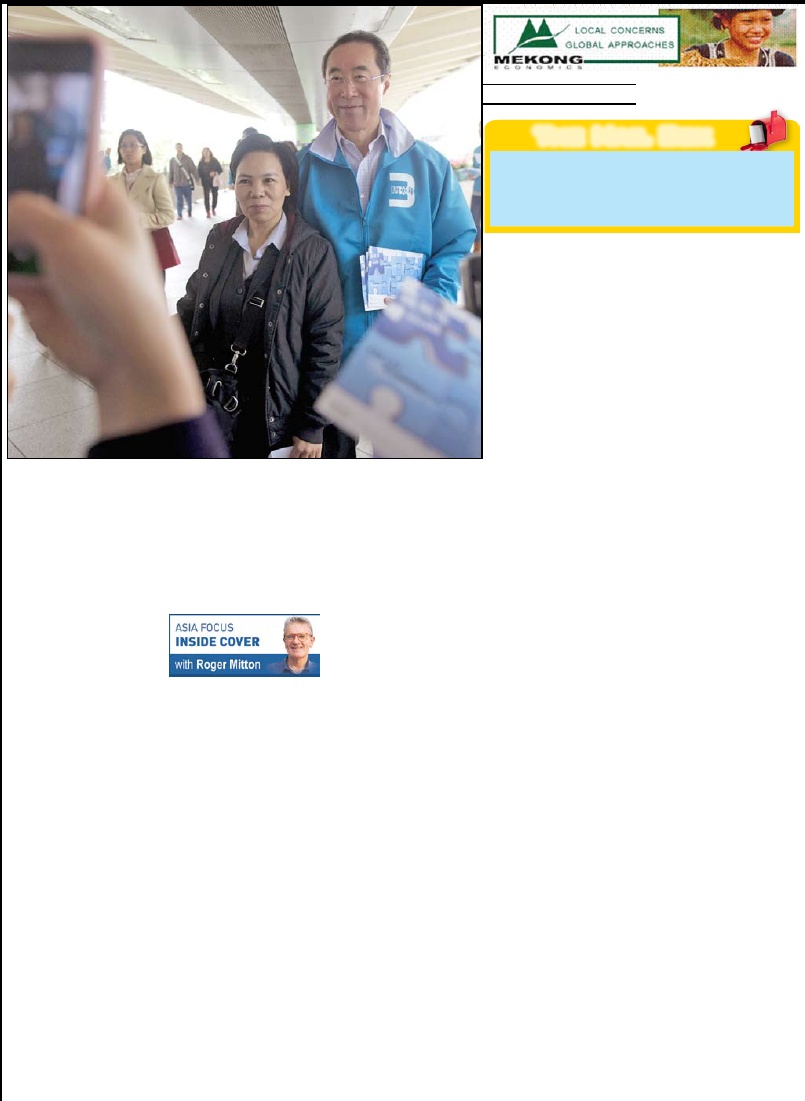



n
ews
3
the
M
yanMar
t
iMes
March 19 - 25, 2012
YANGON – The UnitedStates is concerned aboutthe plight of thousandsof people displaced byfighting between troops andethnic rebels in northernMyanmar, a US specialenvoy said last week“We have seen progress inmany ethnic minority areasover the last several monthsand weeks,” Mr DerekMitchell told reporters in Yangon, referring to a seriesof peace deals between thegovernment and otherguerrilla groups.“But in the Kachin Statethe violence is stickingout as inconsistent with atrend toward dialogue andconfidence building andnational reconciliation thatwe’ve seen.”Fierce fighting in KachinState between governmenttroops and the KachinIndependence Armysince June last year hasdisplaced tens of thousandsof people.“The immediate concernthat we have is on the issue of internally displaced persons,who by any definition areinnocent, caught in thecrossfire of conflict. Andwe’re entering, as you allknow better than I, rainyseason, and that can createeven more complications fortheir lives and wellbeing andsecurity,” Mr Mitchell said.He encouraged thegovernment to do its utmostto guarantee internationaland local humanitariangroups access to refugeecamps throughout thestate.“I understand thepolitical and securitycomplications involved butI’d very much encourageserious consideration by thegovernment in dialogue withthe international communityto find a way to enableprovision of much-neededaid to these citizens.He announced the USwould provide US$1.5million in additional fundingto the UN refugee agency toassist those displaced.Civil war has grippedparts of Myanmar sinceindependence in 1948. Anend to the conflicts andalleged rights abusesinvolving governmenttroops is a key demand of Western nations which haveimposed sanctions on theregime. –
AFP
By Kyaw Hsu Mon
THE Myanmar people will decidewhether the April 1 by-elections arefree and fair, United States envoy MrDerek Mitchell said last week.Mr Mitchell said the by-electionswould be “a tangible moment on theroad to reform” and while he describedhis meetings with the Union ElectionCommission as encouraging. hereceived no commitment on allowinginternational poll monitors into thecountry to observe the vote.“It’s actually up to the people of the country in elections to decidewhether this [election] was acceptablein terms of the representation of the popular will, whether it wasconducted freely and that they wereable without intimidation to exercisetheir right to vote,” he said at a pressconference in Yangon on March 15during a five-day visit.The Union Solidarity andDevelopment Party will contest all48 seats in the April 1 by-elecitons,while the National League forDemocracy will contest 47. Almost 20parties are fielding a candidate in thevote, with parties registered sincethe November 2010 general electionrequired to contest a minimum of three constituencies.But the US is not interested inwho wins the vote so much as themanner in which it is conducted, MrMitchell said.“The outcome of the election is upto the people of this country, that’snot what our interest is. Our interestis the process; that it be free, that itbe fair, that it be transparent, that ittruly represent the will of the peopleof this country and we do see this... as a critical moment and markertowards building trust and confidenceon the road to democracy.”He played down the recentcontroversy over voter lists, sayingthat there were “concerns aboutvoter rolls in many countries”.“But if there are concerns thereshould be a process as I believe thereis. I talked with the Union ElectionCommission and I was encouragedthat they are taking it seriously andproviding an opportunity for partiesto raise issues like voter rolls.“There may also be questionsabout advanced voting and whetherthere’s adequate oversight on thatfront. But it’s up to the parties andit’s up to the people of the countryto provide the necessary oversightand final word on whether this doesin fact represent their will and isacceptable.”He said there had been “noannouncement to us” about whetherinternational poll monitors wouldbe allowed into the country for the April 1 vote but said the US hadencouraged the government to givethem the green light, pointing outthat it would assist with the holdingof future elections.“There are organisations in Asia as well as elsewhere that areprofessionals that can assist inmaking recommendations afterelections for how things could be donebetter and I think it would certainlybe a point of reassurance to theinternational community that thiswas open for people to see how it wentand that there were professionalobservers on the scene,” he said.Regardless of whether observersare allowed in, Mr Mitchell saidthe US hoped that after the votethe Myanmar people “feel it wasacceptable, it was a marker, we’ll doit better next time perhaps but it isacceptable and it will build trust”.When asked whether free and fairby-elections would result in the USlifting some of its sanctions againstMyanmar, Mr Mitchell said otherissues, including the release of allprisoners of conscience and peacewith ethnic groups, also had to betaken into consideration.“But we continue to see trendsin the right direction, we can seemomentum moving in the rightdirection, so we will respond afterthe elections in appropriate fashionif we believe that they are held free,fair and transparently.”However, he also hinted thatlifting sanctions could take sometime and the first to go would bethose that “potentially get in the wayof that reform process”.“We spent a lot of time over thepast 20 years putting sanctions onfor various reasons but there wasn’ta lot of thought as to how to unpeelthem and work back.“If there’s reform occurring thenwe want to be working with thepeople here in that direction.”Mr Mitchell said he had beenimpressed by President U TheinSein’s March 1 speech, whichhe described as “tremendouslyvisionary”.“I think it echoes what the NLD hasbeen saying but I think [President UThein Sein] has put it in his ownwords and he seems committedtowards that same path and thatgives hope that that partnershipnot just with the NLD but thepeople throughout society and thegovernment are moving in the samedirection and that’s important.“That’s the work that we’re tryingto assist ... and I have optimismbut there’s so many dangers andchallenges ahead. We have noillusions about the complicatedway forward but we hope that thiscountry continues to be a real beaconof promise.”The March 12-16 visit was MrMitchell’s sixth to Myanmar in sevenmonths, and included meetingswith UEC chairman U Tin Aye,Pyithu Hluttaw Speaker Thura UShwe Mann and Amyotha HluttawSpeaker U Khin Aung Myint.Speaking to reporters aftermeeting Mr Mitchell in Yangon onMarch 14, Daw Aung San Suu Kyisaid the by-elections had dominatedtheir discussions.“I have been going around thecountry quite a lot in the last severalweeks and well, there is no doubtabout it that our greatest asset isour people. There is so much spiritin them even though they are so poorand there is so much that needs tobe done to help them to realise theirfull potential. So I would put peoplefirst. We want people-first politicsin Burma,” she said.
– Additionalreporting by Shwe Yinn Mar Oo
GENEVA – A UN expert calledlast week for a review of sanctionsby some Western states againstMyanmar.“I am not saying that they mustbe lifted, but they must be analysedin detail,” UN special rapporteuron human rights in Myanmar, MrTomas Ojea Quintana, said onMarch 13.This is “because they are a humanrights issue”, Mr Quintana saidduring a press conference afterpresenting his report on the situationin Myanmar to the UN Human RightsCouncil.“I really believe that sanctions haveto do with human rights, in differentareas, particularly in economic, socialand cultural rights. Because of that,we have the responsibility to addressit publicly, openly, not just as acarrot” for reforms, he added.The European Union, United Statesand other Western nations this yearstarted easing sanctions on Myanmarin recognition of recent positivemoves toward political reform afterdecades of direct military rule.Washington’s partial lifting nowallows it to support assessmentmissions and limited technicalassistance in Myanmar bybodies such as the World Bank, Asian Development Bank andInternational Monetary Fund.However, it continues to ban all tradeand investment with Myanmar andhas imposed a range of other punitivemeasures.The 27-nation EU meanwhile liftedtravel bans against the nation’sleaders as a first step in January,while pledging further action if therewere continued change. At stake areembargos on arms deliveries, loggingand mining, the resumption of aid,and unlocking assets of more than900 firms and utilities.Mr Quintana, who visited Myanmarin February, noted that recent reformshave had a positive impact butthat serious human rights concernsremain.The concerns “cannot be ignoredin the rush to reform and to moveforward”, said the UN rapporteur,pointing to the “lack of an independent,impartial and effective judiciary” touphold the rule of law.Discrimination against ethnicminorities also persists, said MrQuintana, stressing that guaranteeingrespect for their rights was “essentialfor national reconciliation” and for long-term social and political stability.The credibility of April 1 by-elections “will not be determinedsolely on the day of the vote, but onthe basis of the entire process leadingup to and following election day”, MrQuintana said. –
AFP
US voicesconcernover IDPsin Kachin
People will decide if vote is credible: US
Quintanacalls forsanctionsrethink
US special envoy Mr Derek Mitchell talks to the media at a pressconference at the US embassy in Yangon on March 15.
Pic: AFP
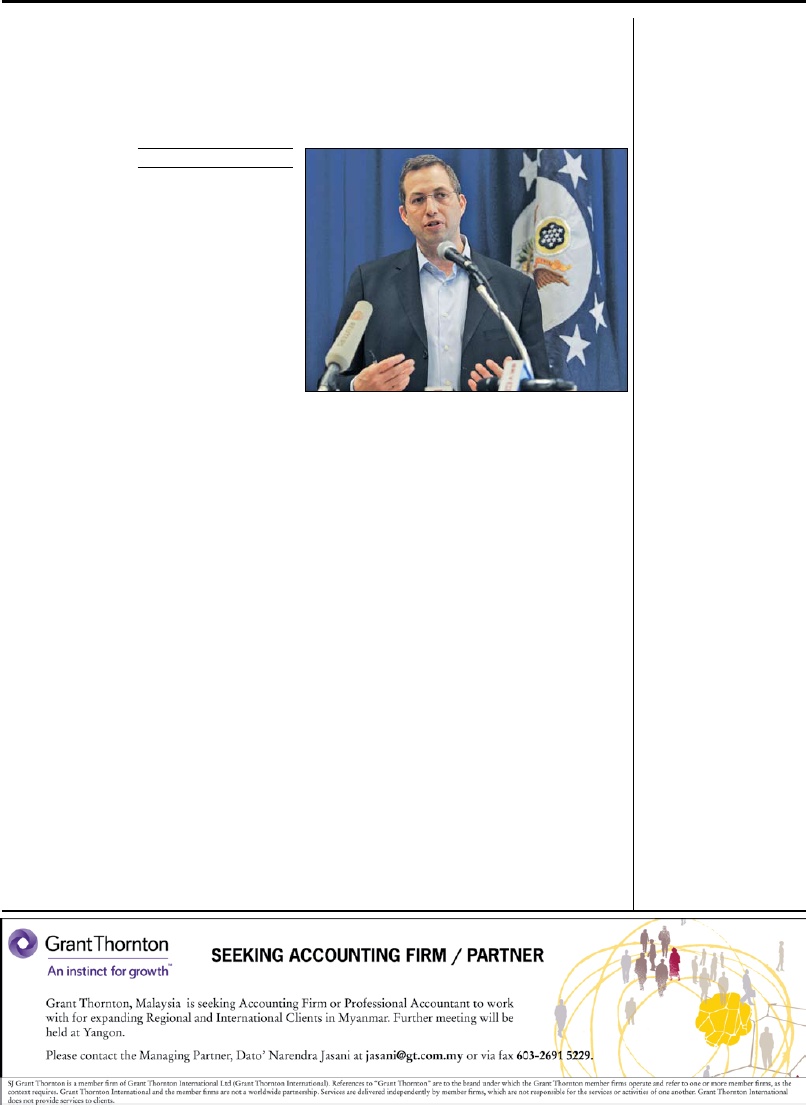

検索履歴:
結果00中00
00結果次の結果
p.
Notes
Post Note
